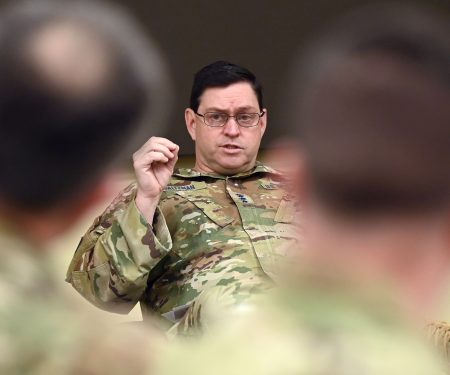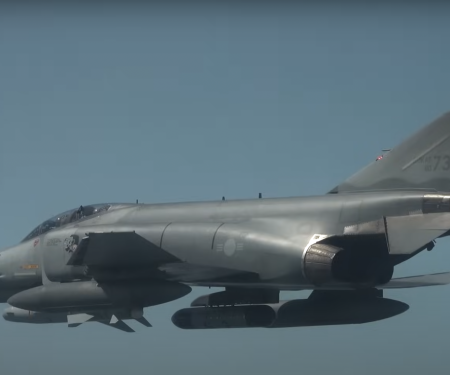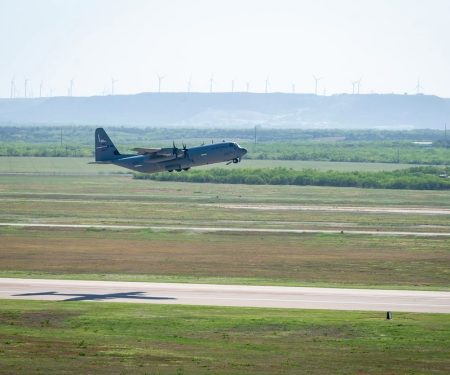Radar Sweep
Senate Overwhelmingly Passes Aid for Ukraine, Israel, and Taiwan With Big Bipartisan Vote
The Senate has passed $95 billion in war aid to Ukraine, Israel, and Taiwan, sending the legislation to President Joe Biden after months of delays and contentious debate over how involved the United States should be in foreign wars. Biden, who worked with congressional leaders to win support, is expected to quickly sign the legislation and start the process of sending weapons to Ukraine, which has been struggling to hold its front lines against Russia. The legislation would also send $26 billion in wartime assistance to Israel and humanitarian relief to citizens of Gaza, and $8 billion to counter Chinese threats in Taiwan and the Indo-Pacific. U.S. officials said about $1 billion of the aid could be on its way shortly.
As the US Air Force Fleet Keeps Shrinking, Can it Still Win Wars?
While modern aircraft do offer more speed, range, stealth and other advantages over previous generations of technology, experts worry the Air Force simply has too few airplanes to do what Congress and the joint force expects of it.
China’s Economy Is ‘Failing,’ US Indo-Pacific Commander Says
The U.S. military commander in the Indo-Pacific said he didn’t believe the economic growth figures reported by China and described the country’s economy as failing. Adm. John C. Aquilino, head of the U.S. Indo-Pacific Command, spoke at a briefing with reporters in Tokyo. He said China’s economy “has drastically been reduced” because of a “real-estate market crash.”
DOD Seeks Changes to Reporting on Space Attacks, Space Domain Awareness Sharing
The Defense Department would only need to report foreign attacks on "critical" national security space capabilities under a legislative proposal submitted to Congress last week. Rather than requiring the commander of U.S. Space Command to provide Congress notice of attempts to “disrupt, degrade or destroy” any such capabilities, it would only need to tell Congress if the capability is deemed “critical,” according to the proposal.
Air Force Issues Call for Cyber, Electromagnetic, Sensing Capabilities to Support ABMS
The Air Force issued a call to industry April 23 in its hunt for new tools to improve its sensor architectures and degrade adversaries’ ability to target U.S forces. The outreach came in an update to a broad agency announcement for technologies to support an operationally focused Advanced Battle Management System (ABMS), which is the Department of the Air Force’s contribution to the Pentagon’s warfighting construct known as Combined Joint All-Domain Command and Control.
More Raptors Arrive on Okinawa as Part of Rotating Fighter Presence
Another contingent of F-22 Raptors have landed on Okinawa as part of an Air Force plan to replace retired F-15 Eagles with frequent rotations of temporary replacement fighters. Six Raptors from the 27th Fighter Squadron at Joint Base Langley-Eustis, Va., arrived Saturday to support the ongoing return of F-15C/D Eagles to the United States, a spokeswoman for the 18th Wing, Master Sgt. Natasha Stannard, said by email April 23.
OPINION: Now is Not the Time to Scale Back on the B-21 Bomber Program
Given their global range, ability to carry large payloads, and unmatched stealth, B-21s will play a crucial role in missions that span the operational spectrum. In times of peace, they will deter adversaries, reassure allies, and favorably shape regions that are critical to our national interests.
Air Force Maintenance Mishaps Are Rising. Can a Worksheet Fix It?
How is your personal stress? How much sleep did you get last night? Do you need to use hazardous materials or chemicals to complete your next task, and how is the lighting in the workspace? Those are just some of the questions that Air Education and Training Command wants its aircraft maintainers to answer on a new worksheet it rolled out in February.
PODCAST: Gen. Goldfein: His Rescue Story, Leadership: Character-Competence-Curiosity, and Uber as the Future of CSAR
This special episode features former Chief of Staff of the Air Force Gen. Dave Goldfein. We discuss how his daring rescue after being shot down over enemy territory forged his views on everything from leadership (“Am I worthy?”) to the future of CSAR (spoiler: the “Uber” model). We also dive into culture versus technology, partnering with Silicon Valley, and how the United States’ CSAR capability serves as a strategic coalition asset.
Small Fraction of Soldiers Experiencing Sexual Harassment Filed Complaints, Pentagon Watchdog Finds
After the alleged sexual harassment and gruesome slaying of Spc. Vanessa Guillén in 2020, Army leaders pledged to create a culture that protects the service's junior troops—particularly women in the ranks. But four years later, it may still be struggling to understand the scope of the problem.
OPINION: In a Taiwan Conflict, Tough Choices Could Come for Big Tech
Several of the companies that came to Ukraine’s defense have much deeper economic ties to China than they did to Russia, and those connections could expose them to Chinese coercion. So what, if anything, should the U.S. government do about these entanglements? There are no easy solutions. Preemptively forcing companies to eliminate their connections to China, often referred to as “decoupling,” would be costly and may not lead to geopolitical stability.
US Takes Aim at Chinese Banks Aiding Russia War Effort
The U.S. is drafting sanctions that threaten to cut some Chinese banks off from the global financial system, arming Washington’s top envoy with diplomatic leverage that officials hope will stop Beijing’s commercial support of Russia’s military production, according to people familiar with the matter.
OPINION: The US— and Its Troops Abroad—Are Vulnerable to Low-Flying Drones
Uncrewed aircraft systems have become a significant security problem for which the U.S. military has minimal countermeasures, write Senate Armed Services Committee chairman Sen. Jack Reed (D-R.I.) and ranking member Sen. Roger Wicker (R-Miss.) In classified briefings and open settings, our committee has examined the threat posed by high-altitude craft and low-altitude drones. We discovered a series of underlying issues complicating an effective response to them.
Vice President Harris to Give Air Force Academy Commencement Speech
The Air Force Academy announced April 23 that Vice President Kamala Harris will give the keynote speech at graduation on May 30. As vice president, Harris is part of the regular rotation of speakers for the academy, which graduates about 1,000 cadets each year. This is her first time speaking to the Air Force Academy graduating class.




